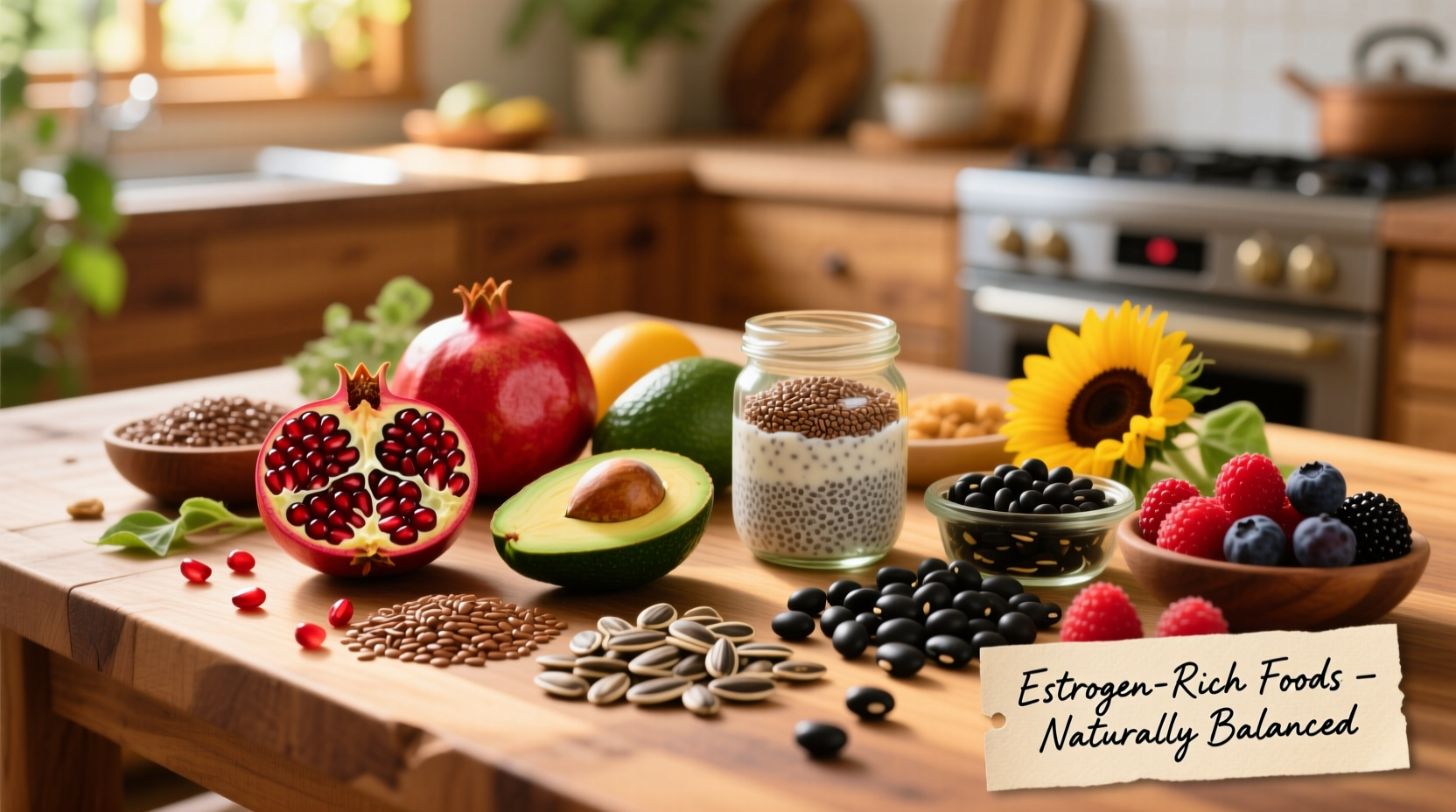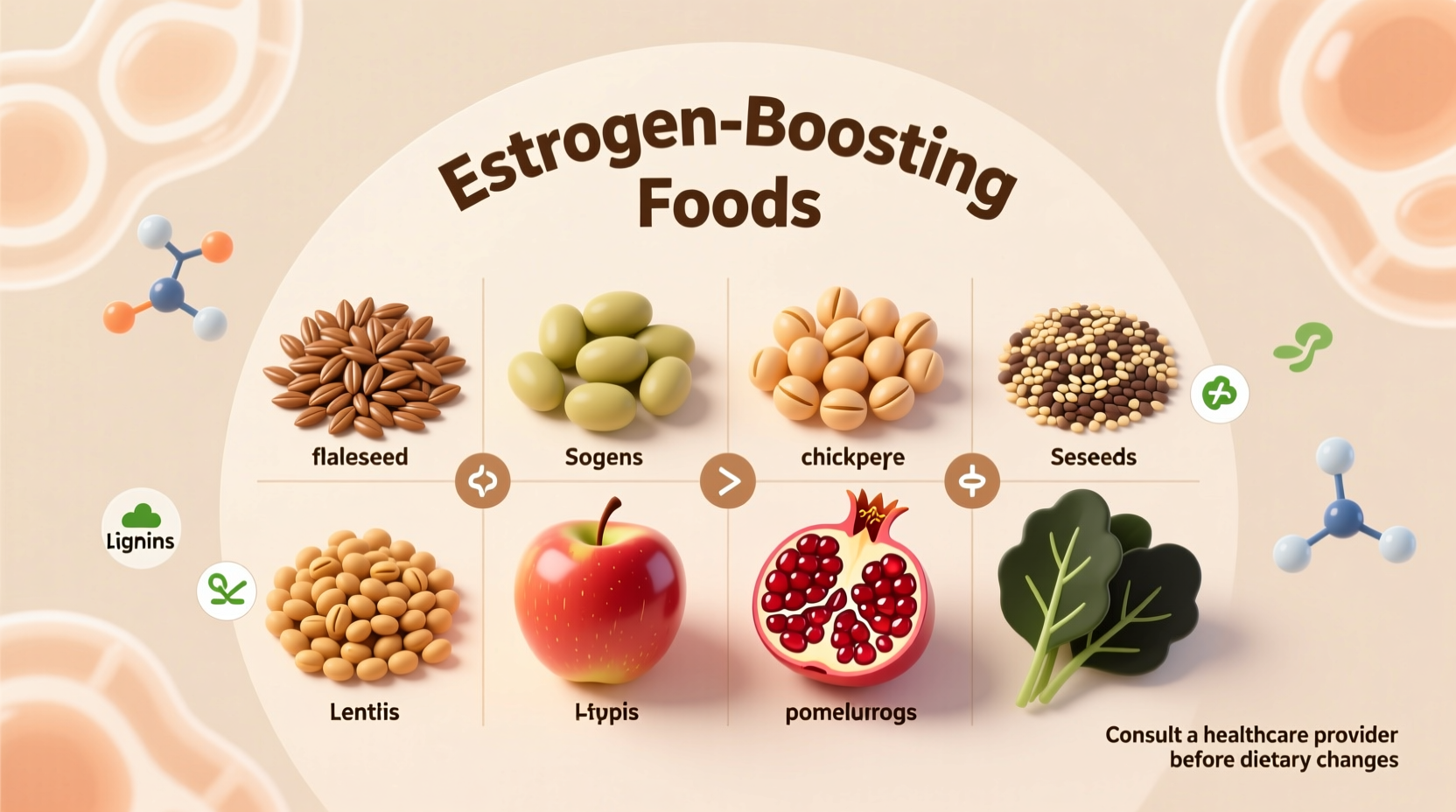Based on current scientific evidence, the top foods that naturally support estrogen levels include soy products (tofu, tempeh, edamame), flaxseeds, sesame seeds, lentils, chickpeas, and certain fruits like pomegranates and apples. These contain phytoestrogens - plant compounds that can mimic estrogen's effects in the body. Effects vary based on individual health status, gut microbiome, and consumption patterns.
Why Estrogen Balance Matters for Your Health
Estrogen isn't just a "female hormone" - it plays crucial roles in both men and women's health, affecting bone density, cardiovascular function, and cognitive performance. As we age, natural estrogen production changes, particularly during perimenopause and menopause. Many people seek dietary approaches to support hormonal balance without pharmaceutical interventions.
Understanding which foods can influence estrogen levels helps you make informed choices based on your specific health needs. Research shows that phytoestrogens - plant-derived compounds with estrogen-like activity - can bind to estrogen receptors and produce mild estrogenic or anti-estrogenic effects depending on your body's current hormone levels.
Science-Backed Estrogen-Supporting Foods
Not all "estrogen-boosting" claims are equal. Let's examine the foods with the strongest scientific backing:
Soy Products: The Most Researched Option
Soy contains isoflavones, particularly genistein and daidzein, which are the most studied phytoestrogens. Contrary to popular myths, moderate soy consumption is considered safe and potentially beneficial:
- Fermented soy (tempeh, miso, natto) provides more bioavailable isoflavones
- Whole soy foods (edamame, tofu) offer complete protein plus phytoestrogens
- Soy milk provides a dairy alternative with hormonal benefits
According to research published in the American Journal of Clinical Nutrition, consuming 25-50mg of soy isoflavones daily (about 1-2 servings of whole soy foods) shows measurable effects on estrogen metabolism without adverse effects for most people.
Flaxseeds: Nature's Estrogen Modulator
Flaxseeds contain lignans - phytoestrogens that may help balance estrogen levels. What makes flax unique:
- Must be ground to access the beneficial compounds (whole seeds pass through undigested)
- Contains both soluble and insoluble fiber that supports estrogen elimination
- Provides omega-3 fatty acids that reduce inflammation
| Food | Phytoestrogen Content | Recommended Daily Amount | Best Preparation Method |
|---|---|---|---|
| Soybeans (edamame) | 130mg isoflavones/cup | ½ cup cooked | Steamed with sea salt |
| Flaxseeds | 379,358mcg lignans/tbsp | 1-2 tbsp ground | Freshly ground daily |
| Sesame seeds | 11,157mcg lignans/tbsp | 1-2 tbsp | Dry toasted |
| Lentils | 1,823mcg isoflavones/cup | ½ cup cooked | Slow-cooked in soups/stews |
How These Foods Actually Work in Your Body
Phytoestrogens don't simply "boost" estrogen - they interact with your endocrine system in complex ways:
- Adaptive binding: Phytoestrogens bind to estrogen receptors but with weaker effects than your body's natural estrogen, potentially balancing excess or deficiency
- Metabolism influence: Certain foods affect how your liver processes and eliminates estrogen
- Gut microbiome connection: Your gut bacteria convert phytoestrogens into active forms - gut health matters
A 2022 review in Nutrients journal explains that phytoestrogens function as selective estrogen receptor modulators (SERMs), meaning they can have estrogenic effects in some tissues while acting as anti-estrogens in others. This explains why soy consumption shows protective effects against breast cancer in some populations while supporting bone health.
Important Considerations Before Adding These Foods
While generally safe, these foods aren't appropriate for everyone. Consider these context boundaries:
- Thyroid conditions: Soy may interfere with thyroid medication absorption - separate consumption by 4 hours
- Hormone-sensitive cancers: Those with estrogen receptor-positive cancers should consult oncologists before increasing phytoestrogen intake
- Timing matters: Effects build over weeks/months, not days - consistency is key
- Individual variation: Gut bacteria composition significantly affects how you process phytoestrogens
The NIH Office of Dietary Supplements notes that most people can safely consume phytoestrogen-rich foods as part of a balanced diet, but therapeutic effects require consistent consumption over 8-12 weeks. Their research shows significant individual variation in response based on gut microbiome composition.

Practical Implementation Guide
Ready to incorporate these foods? Here's how to do it effectively:
Simple Daily Swaps
- Replace morning cereal with flaxseed-spiked oatmeal
- Use tempeh instead of chicken in stir-fries (marinate 30 minutes first)
- Add roasted chickpeas to salads for crunch and phytoestrogens
- Snack on hummus with carrot sticks instead of chips
Sample Meal Plan for Hormonal Support
- Breakfast: Greek yogurt with ground flaxseed, berries, and pumpkin seeds
- Lunch: Lentil soup with kale and a side of edamame
- Snack: Apple slices with almond butter and sesame seeds
- Dinner: Baked salmon with roasted asparagus and quinoa
Remember that food diversity matters - don't focus on just one phytoestrogen source. A 2023 study in the Journal of Nutrition found that people consuming varied phytoestrogen sources showed more stable hormone levels than those relying on single foods.
When to Consult a Healthcare Professional
While dietary approaches can support hormonal health, certain situations require professional guidance:
- Severe menopausal symptoms disrupting daily life
- History of hormone-sensitive cancers
- Thyroid disorders requiring medication
- Unexplained menstrual changes
- Planning pregnancy while managing hormonal concerns
Your healthcare provider can help determine if dietary approaches alone are sufficient or if additional interventions are needed. They may recommend blood tests to assess your current hormone levels before making significant dietary changes.











 浙公网安备
33010002000092号
浙公网安备
33010002000092号 浙B2-20120091-4
浙B2-20120091-4